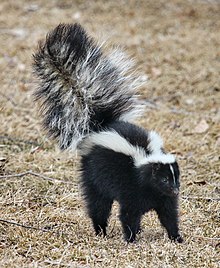
LaFayette, GA: A skunk has tested positive for animal rabies, and public health officials are reminding Walker County residents about the potential dangers of rabies and urging them to make sure their pets are vaccinated against the potentially deadly disease. This is the first confirmed animal rabies case in Walker County for 2021 and the first since 2014.
While confirmed cases are relatively rare, officials emphasize animal rabies can be found throughout Walker County. “Rabies is always circulating in our wild animal population,” says the Walker County Health Department’s Environmental Health Manager Jason Osgatharp.
Osgatharp cautions residents to avoid wild, stray, and possibly unvaccinated animals that may be infected with rabies and emphasizes residents should take additional precautions to protect themselves, their families, and their pets. “Getting your pet vaccinated against rabies is the single best way to protect your pet from rabies,” Osgatharp says. “It’s important to do it for their protection, for our protection, and because it’s state law.”
“Reducing the risk of rabies in domestic animals and limiting human contact with wild animals are two measures central to the prevention of human rabies,” explains Osgatharp. Other effective precautions against rabies include:
- Vaccinate all dogs, cats and ferrets against rabies. Check with your veterinarian to make sure your pets have up-to-date protection against rabies. Remember that the vaccination of pets against rabies protects not only the pets, but more importantly, protects people.
- Don’t leave pet food out where wild animals can access it. Leaving pet food out is a sure way of getting wild animals to visit your home endangering you, your family and your pets.
- Remind children to avoid animals they don’t recognize, especially
stray or wild animals. These animals may be infected with rabies.
- Small children should not be left unattended with dogs, even if the dog is a pet or the child is familiar with it.
- Keep pets at home. Obey any county laws requiring that dogs be
restrained to the owner’s property. Pets that are kept close to home are less likely to encounter a rabid animal.
- Report any raccoon, fox, bat or skunk that is out during the day in a residential area or that is behaving strangely to the local Georgia Department of Natural Resources Game and Fish Division office at 1-800-241-4113.
- Report stray dogs and cats and aggressive or sick-appearing animals to the local animal-control office.
- Don’t attempt to assist injured or sick animals without professional help. Even animals which would never bite otherwise can bite when sick or in pain.
- Bats found in sleeping quarters should be captured and tested for rabies even when there is no evidence of a bite wound or contact with the sleeping individuals.
- After-hours calls involving aggressive animals should be directed to 911.
- After-hours calls involving animal bites and their potential for rabies exposure should be directed to 866-PUB-HLTH (866-782-4584).
Walker County residents can contact the Walker County Health Department’s Environmental Health Office in LaFayette at 706-639-2574 for additional information or with any questions or concerns.
Residents can also visit the Northwest Georgia Public Health website at https://nwgapublichealth.org/environmental-health/rabies for information on animal rabies and rabies precautions. Residents can also visit http://www.cdc.gov/rabies/for comprehensive rabies information.
###
About the Walker County Health Department: The Walker County Health Department works to prevent disease, injury, and disability; promote health, safety, and wellbeing; and prepare for and respond to disasters, thereby improving the quality of life for individuals and families in Walker County. We provide a wide range of medical services, track and prevent the spread of disease, promote health and safety through education and communication, monitor area environmental safety, including restaurant and other food-service inspections, and ensure our community is prepared for public health emergencies. Find us on the web at www.nwgapublichealth.org/counties/walker. Follow us on Facebook to receive news, emergency messages, and health-and-safety information at https://www.facebook.com/WalkerDPH


Bulloch Public Safety
GDOT: Traffic Impacts for the I-16 at I-95 Improvement Projects Through April 17

Bulloch Public Safety
SE Ga Road Work: Weekly Traffic Interruption Advisory Through April 18

Bulloch Public Safety
04/11/2025 Booking Report for Bulloch County

Bulloch Public Safety
04/09/2025 Booking Report for Bulloch County

Bulloch Public Safety
04/10/2025 Booking Report for Bulloch County

Bulloch Public Safety
04/07/2025 Booking Report for Bulloch County

Bulloch Public Safety
04/11/2025 Booking Report for Bulloch County

Catoosa Local News
Teacher Arrested for Improper Sexual Contact with Student







